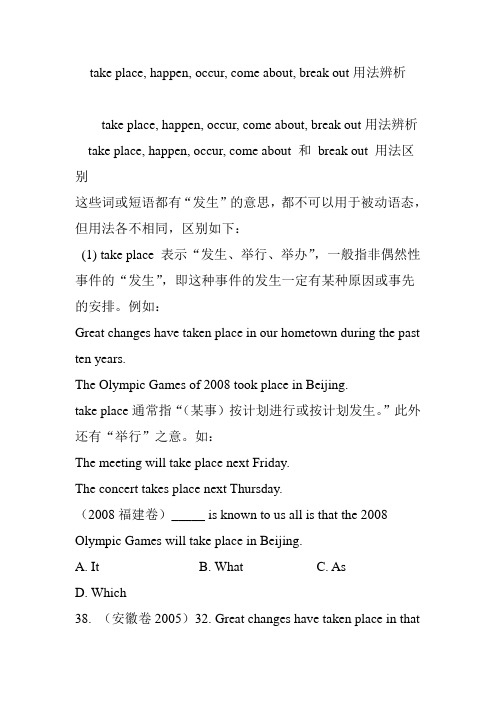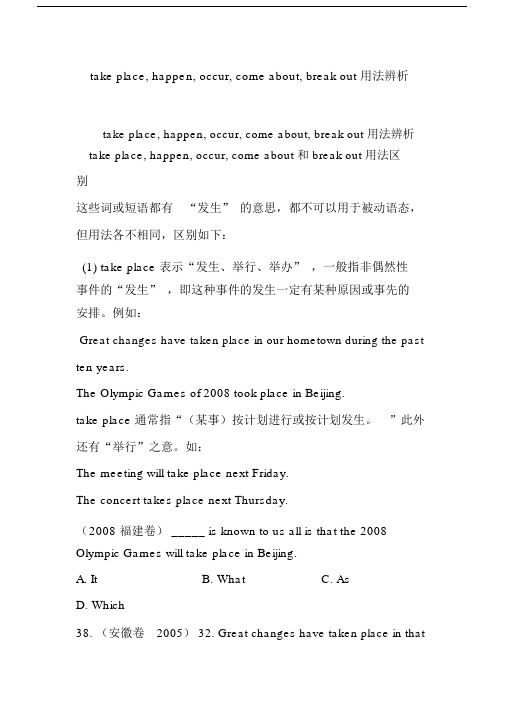take place, happen, occur, come about和break out用法区别
happen等发生类动词的用法

happen等发生类动词的用法在英语学习中,动词的用法是一个重要的部分,其中“happen”等表示发生的动词更是常常让学习者感到困惑。
本文将详细探讨“happen”“occur”“take place”等发生类动词的用法,帮助大家更好地理解和运用它们。
首先,我们来看看“happen”这个词。
“happen”是一个不及物动词,意思是“(偶然)发生;碰巧”。
它通常用于描述意外或偶然发生的事情。
例如:“An accident happened yesterday”(昨天发生了一场事故。
)在这个句子中,“accident”是主语,“happened”是谓语,表明事故的发生是一个偶然的事件。
“happen”常见的结构有“happen to do sth”(碰巧做某事)。
比如:“I happened to meet my old friend in the street”(我碰巧在街上遇见了我的老朋友。
)需要注意的是,“happen”不能用于被动语态。
如果要表达“某事被发生”,我们通常会用“come about”或“occur”。
接下来,我们谈谈“occur”。
“occur”也是不及物动词,意思是“发生;出现;存在”,它的使用频率也很高。
“occur”与“happen”在很多情况下可以互换使用,但“occur”更正式一些。
例如:“A strange thing occurred last night”(昨晚发生了一件奇怪的事。
)“occur”常见的结构有“it occurs to sb that”(某人突然想到),例如:“It occurred to me that I had left my keys at home”(我突然想到我把钥匙落在家里了。
)然后是“take place”,这个短语也表示“发生;举行”,但它通常指有计划、有安排地发生,比如会议、活动等。
例如:“The sports meeting will take place next week”(运动会将在下周举行。
英语中的“发生”happen, occur ,take place,和break out的区别

英语中的“发生”happen,occur ,take place,和break out的区别take place和happen 的区别:(1)、发生的性质不同take place常指按计划“发生”happen往往表示事情的发生带有偶然性, happen是一般用语(2)、主语的条件不同happen常指具体事件的发生,特别指那些偶然的或未能预见的“发生”。
break out 爆发,发生(战争,战斗;意想不到的事情)=occur suddenly爆发;(突然)发生come about表示“发生、产生",多指事情已经发生了,但还不知道为什么,常用于疑问句和否定句(3)、搭配不同take place表示“发生”,可与happen 换用,但其后面一般不接to sb./sth.结构。
break out 爆发,发生=occur suddenly爆发;(4)、occur常用句型It occurs to sb. that 某人突然想起……具体应用1.take place 发生,举行;take place of 代替(1)、She wanted Hugh's wedding to take place quickly她希望休快点举行婚礼。
(2)、This year's event will take place on June 19th, a week earlierthan usual今年的活动将于6月19日举行,比往年提前一周。
(3)、Earlier reports suggested that a meeting would take place on Sunday早先的报道暗示周日可能会召开会议。
(4)、The meeting will take place as planned.会议将按预定的计划进行。
(5)、I'll take place of my father for a while.我将暂时代替我父亲。
happen,occur和takeplace区别

happen,occur和takeplace区别
均为不及物动词
happen指“偶然发⽣”时,主语为“事”;
occur指“发⽣”时可与happen 换⽤,但后接to sb./sth.时,两者含义不同:happen to sb./sth.,主语为⼈时,译为“碰巧”;多指不好的事情发⽣在某⼈(物)⾝上;occur to sb./sth.指“某种思想等呈现于某⼈的知觉中”。
take place 表⽰“发⽣”,可与 happen 或occur换⽤,但其后⾯⼀般不接 to sb./sth.结构;指必然会发⽣的事情时,多⽤take place;此外take place 还可表⽰“举⾏某种活动”。
He happened to know the place.他碰巧知道那个地⽅。
(主语为“他”,⼈作主语)
When did the earthquake occur/happen?地震是什么时候发⽣的?
Didn’t it occur to you to phone them about it?你难道就没想过给他们打个电话?(思想)
Has anything happened to him?他出什么事了吗?(不好)
In 1919, the May 4th Movement took place in China.⼀九⼀九年,中国发⽣了五四运动。
take place, happen, occur, come about, break out用法辨析

take place, happen, occur, come about, break out用法辨析take place, happen, occur, come about, break out用法辨析take place, happen, occur, come about 和break out 用法区别这些词或短语都有“发生”的意思,都不可以用于被动语态,但用法各不相同,区别如下:(1) take place 表示“发生、举行、举办”,一般指非偶然性事件的“发生”,即这种事件的发生一定有某种原因或事先的安排。
例如:Great changes have taken place in our hometown during the past ten years.The Olympic Games of 2008 took place in Beijing.take place通常指“(某事)按计划进行或按计划发生。
”此外还有“举行”之意。
如:The meeting will take place next Friday.The concert takes place next Thursday.(2008福建卷)_____ is known to us all is that the 2008 Olympic Games will take place in Beijing.A. ItB. WhatC. AsD. Which38. (安徽卷2005)32. Great changes have taken place in thatschool. It is no longer ______ it was 20 years ago, _____ it was so poorly equipped./A. what; when B. that; which C. what; which D. which; that (名词)(2) happen 作“发生、碰巧”解,常指具体事件的发生,特别指那些偶然的或未能预见的“发生”,一般用于偶然或突发性事件。
高考英语:高频短语剖析(一)

高考英语:高频短语剖析(一)导语:“get up,get in,get on,get off……这些长相酷似的短语为什么会是一道题的四个选项?难道答案是ABCD?”你是否常常因为这些“N胞胎”而抓狂?专门为大家详细剖析这类易混短语。
take高频短语1. take up表示“占据(时间或空间),拿起(武器),从事,采取”。
例如:These big desks take up too much room,so we’d better take them away. 这些大桌子占据了太多的空间,我们最好把它们搬走。
2. take effect表示“开始起作用,生效”。
辨析:take effect 和come into effect的区别。
come into effect表示“生效”,主要指的是契约、合同等产生法律效力。
take effect表示“起到作用,有效果”,如药剂、主意、措施等起到了预期作用。
例如:(1)The new traffic law will take effect next week. 新的交通法将在下周生效。
(2)These rules shall come into effect as of the date of promulgation. 本细则自发布之日起施行。
3. take place表示“发生、进行”。
辨析:take place 和 happen,occur,come about,break out 的区别。
take place表示“发生、举行、举办”,一般指非偶然性事件的“发生”,即这种事件的发生一定有某种原因或事先的安排。
happen 作“发生、碰巧”解,一般用于偶然或突发性事件。
occur作“发生、想到、突然想起”解,其意义与happen类似。
come about表示“发生、产生”,多指事情已经发生了,但还不知道为什么,常用于疑问句和否定句。
break out意思为“发生、爆发”,常指战争、灾难、疾病、火灾、争吵等的发生,也可以表示突然大声叫喊等。
take place的同义词组

take place的同义词组“Take place” 同义词组可以有很多,这里列举几个常用的同义词组:1. Occur: 发生、出现。
Occur 是 take place 的一个常见同义词,表示“发生或出现”的意思。
例如:The accident occurred on a busy street.2. Happen: 发生、出现。
Happen 是 take place 的另一个常见同义词,表示“发生或出现”的意思。
例如:The meeting happened last week.3. Transpire: 发生、出现。
Transpire 是 take place 的另一个更少见的同义词,表示“发生或出现”的意思。
例如:Strange things transpired during the night.4. Take effect: 生效、实施。
Take effect 是take place 的另一个同义词,表示“生效或实施”的意思。
例如:The new regulations will take effect next month.5. Be held: 举行、举办。
Be held 是 take place 的另一个同义词,表示“举行或举办”的意思。
例如:The conference will be held in New York.6. Come about: 发生、传出。
Come about 是 take place 的另一个同义词,表示“发生或传出”的意思。
例如:Rumors came about that the company was going bankrupt.7. Occasion: 举行、举办。
Occasion 是 take place 的另一个同义词,表示“举行或举办”的意思。
例如:We are planning to have an occasion for my father's birthday.8. Arise: 出现、发生。
takeplace,happen,occur,comeabout,breakout用法辨析.doc

take place, happen, occur, come about, break out 用法辨析take place, happen, occur, come about, break out 用法辨析take place, happen, occur, come about 和 break out 用法区别这些词或短语都有“发生”的意思,都不可以用于被动语态,但用法各不相同,区别如下:(1)take place 表示“发生、举行、举办” ,一般指非偶然性事件的“发生” ,即这种事件的发生一定有某种原因或事先的安排。
例如:Great changes have taken place in our hometown during the past ten years.The Olympic Games of 2008 took place in Beijing.take place 通常指“(某事)按计划进行或按计划发生。
”此外还有“举行”之意。
如:The meeting will take place next Friday.The concert takes place next Thursday.(2008 福建卷) _____ is known to us all is that the 2008 Olympic Games will take place in Beijing.A. ItB. WhatC. AsD. Which38. (安徽卷2005) 32. Great changes have taken place in thatschool. It is no longer ______ it was 20 years ago, _____ it was so poorly equipped./A. what; when B. that; which C. what; which D. which; that(名词)(2)happen 作“发生、碰巧”解,常指具体事件的发生,特别指那些偶然的或未能预见的“发生” ,一般用于偶然或突发性事件。
赛达词汇的比较分析:happen, occur, take place

官方网站: SAT词汇的比较分析:happen, occur, take place下面小马过河小编介绍了有关SAT词汇happen, occur, take place的比较分析,希望对大家有所帮助,考生平时需要熟练掌握近义词的区别,避免混淆使用。
小马过河全国免费电话咨询:400-0123-267。
三者均可表示“发生”,区别如下:1. happen 和occur 通常指未经准备地发生或偶然地发生,两者常可换用,只是后者比前者更正式。
如:The accident happened [occurred] at about 10. 事故大约发生在10 点钟。
表示某一事的发生是因为另一事的结果,通常用happen。
如:What happened when you told her the news? 你告诉她这个消息时,她有何反应?两者之后均可接介词to,但含义不同:happen to 表示某事发生某人身上,occur to 表示某人想起了某事。
如:What happened to you (the radio)? 你(收音机)怎么样了?She hoped nothing bad would happen to him. 她希望不会有什么不幸的事发生在他头上。
A good idea occurred to me. 我想起了一个好主意。
It never occurred to her to ask anyone. 她从未想到去问问别人。
2. take place 通常指预先安排好要发生的事,因此在汉语中除译为“发生”外,还通常译为“举行”。
如:The meeting will take place on Sunday. 会议星期日举行。
Great clanges have taken place here since last year. 自去年以来,这里发生了巨大的变化。
3. 三者表示“发生”都是不及物动词,因此既不能带宾语,也不能用于被动语态。
- 1、下载文档前请自行甄别文档内容的完整性,平台不提供额外的编辑、内容补充、找答案等附加服务。
- 2、"仅部分预览"的文档,不可在线预览部分如存在完整性等问题,可反馈申请退款(可完整预览的文档不适用该条件!)。
- 3、如文档侵犯您的权益,请联系客服反馈,我们会尽快为您处理(人工客服工作时间:9:00-18:30)。
take place, happen, occur, come about和break out用法区别
这些词或短语都有“发生”的意思,但用法各不相同,区别如下:
(1). take place 表示“发生、举行、举办”,一般指非偶然性事件的“发生”,即这种事件的发生一定有某种原因或事先的安排,例如:
Great changes have taken place in our hometown during the past ten years.
The Olympic Games of 2008 will take place in Beijing.
(2) .happen作“发生、碰巧”解,一般用于偶然或突发性事件,例如:
What happened to you? (一般不说:What did you happen?)
Maybe something unexpected happened.
I happened to see him on my way home.
= It happened that I saw him on my way home.
(3). occur作“发生、想到、突然想起”解,其意义相当于happen,例如:
What has occurred? (=What has happened?)
A big earthquake occurred (=happened) in the south of China last month.
It occurred to me that she didn’t know I had moved into the new house.
(4). come about表示“发生、产生”,多指事情已经发生了,但还不知道为什么,常用于疑问句和否定句,例如:
When Mother woke up, she didn’t know what had come about.
I’ll never understand how it came about that you were late three times a week.
Do you know how the air accident came about?
(5). break out意思为“发生、爆发”,常指战争、灾难、疾病或者争吵等事件的发生,也可以表示突然大声叫喊等,例如:
Two world wars broke out last century.
A fire broke out in the hospital in the mid-night.
After the flood, diseases broke out here and there.
She broke out, “That is too unfair!”
occur vi. 1发生2 想起,想到
常用搭配:sth. occurs to sb.:某人突然想起某事;
It never occurred to sb. that…:某人从未想到……
More people are afraid to take planes because several air crashes have occurred this month. Suddenly a good idea occurred to her.
It never occurred to us that the well-dressed man was a pickpocket.
我们决没有想到,那个衣冠楚楚的人是个扒手。
happen vi 1发生(多指偶然发生)2碰巧,恰巧(不可用被动)]
常用搭配:happen to sb.:某人会怎样
happen to be…; happen to do…;
it (so) happened that…
eg The accident happened during a stormy night.
What will happen to them if they lose their way in the forest?
He happened to be out shopping when the fire broke out.= It (so) happened that he was out shopping when the fire broke out.火灾发生时,他碰巧外出购物。
happen常指一件事出乎意料地发生了,强调偶然性,happen还有碰巧;
在以具体事物、事件为主语时happen和occur往往可以通用。
如,The explosion occurred / happened 5 minutes ago.
如果所发生的事不具体,happen比occur要好。
如,I don't know what happened after I left. take place 1发生2 举行(侧重事先计划好或安排好的事情,不能用被动)
eg Do you know when and where the story took place?
The Olympic Games take place every for years.
In 1919,the May 4 th Movement took place in China.
occur 还有"被想到",take place还有"举行"之意。
此时它们不可以互换。
These plants only occur in Africa的意思为"这些植物只是在非洲才有。
"此句中occur 意思为"存在"。
Happen的三种用法与三点注意
一、happen是不及物动词。
happen在初中英语教材中的用法主要有以下三种:
1. "sth.+happen+地点/时间",意为"某地/某时发生了某事"。
例如:An accident happened in that street.那条街发生了一起事故。
What's happening outside?外面发生什么事了?
2. "sth.+happen to+sb."意为"某人出了某事(常指不好的事发生在某人身上)"。
例如:
A car accident happened to him yesterday.昨天他发生了交通事故。
What happened to you?(=What was wrong / the matter with you?)你怎么啦?
3. "sb.+happen+to do sth."意为"某人碰巧做某事"。
例如:
I happened to meet her in the street.我碰巧在街上遇见她。
It happened that I was out when he called.他来访时我碰巧不在。
二、同学们在使用happen时,以下三点情况值得注意:
1. happen为不及物动词,不能用于被动语态。
例如,要表示"这个故事发生在去年。
"不能说:The story was happened last year.但可以说:The story happened last year.
2. happen为短暂性动词,不能与表示一段时间的状语连用。
例如,要表示"这事发生
一年了。
"不能说:This happened for one year.但可以说:This happened one year ago.
3. happen一般用来强调某事发生的偶然性。
如要表示事先安排或有准备的事情或活动,则不能用happen,而要用take place。
例如:
A sports meeting took place(=was held) in our school last week.上周我校举行了运动会。
(不能说:A sports meeting happened in our school last week.)。
